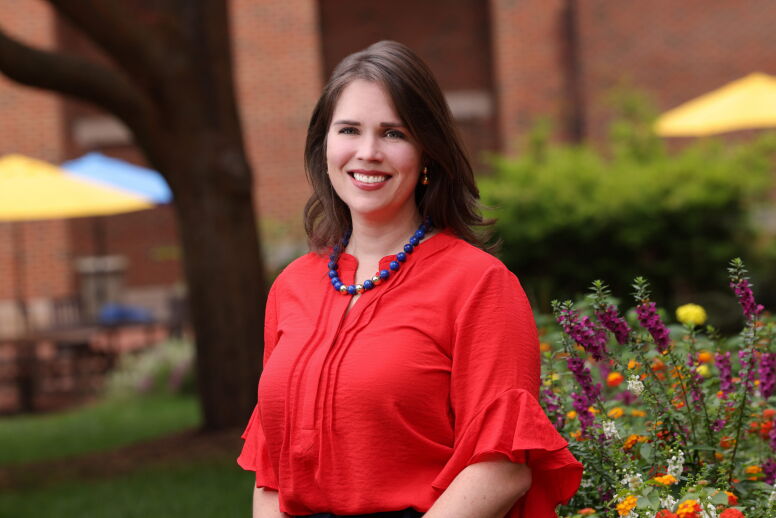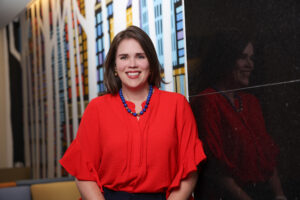News & Stories
Learning to think critically

The most important questions in Professor Kristin Wilson’s classes are the ones students ask about themselves.
For more than a decade, Wilson has challenged UNC Kenan-Flagler Business School Undergraduate Business Program (UBP) and MBA students to practice critical thinking and practical problem-solving as they learn strategic analysis in their strategic management courses.
She brings the same approach to the UBP’s Business Law and Ethics course, a core requirement for business majors.
Through in-class discussions and shared reflections on discussion boards, Wilson’s students explore and debate such abstract concepts as the meaning of “good business.” They question what corporations owe their employees and their customers, and what employees owe a corporation. In the business world, what does it mean to be fair or unfair? Are there limits to what should be bought or sold?
There are no right or wrong answers — and that’s the point.
“Students need a language and a forum to talk about the aspects of business decisions that are not purely strategic or about maximizing profit,” says Wilson. “Ethical decision-making requires an open-ended, exploratory mindset. It requires introspection to become more aware of the values and beliefs that guide our own decision-making. It also requires perspective-taking – becoming more aware of diverse ethical perspectives and how our decisions are experienced by others. I encourage a personal way of learning that.”
Wilson’s course lies at pivotal intersections of philosophy, economics and management theory. She hopes that her course helps students put business education fundamentals — accounting, finance, strategy and management communication — in their broader contexts.
“There are many different ways we teach students to be more effective in business,” says Wilson. “These are just questions about what that effectiveness is for – what it means to be create ‘good’ business or to lead a ‘good’ career. If you are used to defining success solely in terms of specific metrics or achievements, it’s like turning on a new switch in your brain when you start asking yourself these questions.”
 Teaching business ethics was not always in Wilson’s plans. Raised in Charlotte and Chapel Hill, she double majored in economics and Latin American studies as an undergraduate at UNC and hoped to pursue a career in international economic development. After graduation, she hit the career economist jackpot, moving to Washington, D.C., to work for the influential Brookings Institution and then the Federal Reserve, working on economic research projects such as studying economic growth and the factors that make some countries more productive than others.
Teaching business ethics was not always in Wilson’s plans. Raised in Charlotte and Chapel Hill, she double majored in economics and Latin American studies as an undergraduate at UNC and hoped to pursue a career in international economic development. After graduation, she hit the career economist jackpot, moving to Washington, D.C., to work for the influential Brookings Institution and then the Federal Reserve, working on economic research projects such as studying economic growth and the factors that make some countries more productive than others.
Wilson soon became interested in understanding business success from the perspective of decision-makers, particularly the role of non-market institutions that guide everyday decision-making in business, such as different cultural beliefs, social norms and government influence.
At Harvard Business School, she found a group of world-class inter-disciplinary scholars researching business strategy from this perspective and completed a dissertation on the relationship between banks and their regulatory environment.
After earning a doctorate in strategy from Harvard, Wilson joined the UNC Kenan-Flagler faculty in the strategy and entrepreneurship area and has taught a range of courses in strategic management over the years.
The course closest to her heart is the ethics curriculum Wilson started teaching five years ago. At the time, the School’s primary law and ethics course was focused on teaching students to navigate business’s legal environment.
UBP leadership noticed that students increasingly sought out coursework that tackled core issues related to the purpose of business and its relationship to society, and saw an opportunity revise the course in a way that encouraged students to tackle these issues related to business ethics. Wilson was inspired by this vision and felt empowered to start something fresh: a space to connect with students on ethical issues in business that matter most to them.
“I’m still excited about the subject,” says Wilson. “I got my doctorate in business because I thought that understanding decision-making in business is critical to understanding bigger questions about what it means for our society to thrive. I don’t think I could be doing anything more valuable than what I’m doing here with our students.”
Wilson also connects with students outside the traditional classroom. Tapping into her fascination with the social and political environment of business and her background studying Latin America, she has worked with the UBP to create a Global Immersion Elective (GIE) leading student groups Chile and Argentina to learn about differences in non-market decision making in businesses across continents up close.
During the GIE business leaders talk with students about operating in environments with a high degree of political risk and social polarization and a profound lack of trust between businesses and other societal institutions. Students learn directly from local managers how businesses have adapted to widespread social unrest, widespread poverty or inflation rates as high as 10% a month.
“Learning from businesses in Chile and Argentina and experiencing differences in the business environment first-hand are eye-opening for students,” says Wilson. “I’ve always been interested in looking at these types of tectonic environmental shifts in markets and how businesses manage that. I love that students get to learn about these challenges through in-person conversations with business leaders.”
She plans teach the GIE in Argentina and Uruguay in spring 2024. In the meantime, a new group of students are looking within and hashing out weekly debate topics with their classmates to uncover a clearer picture of the type of business leader they will become.
“Thinking critically about values and purpose is essential to a business career,” says Wilson.